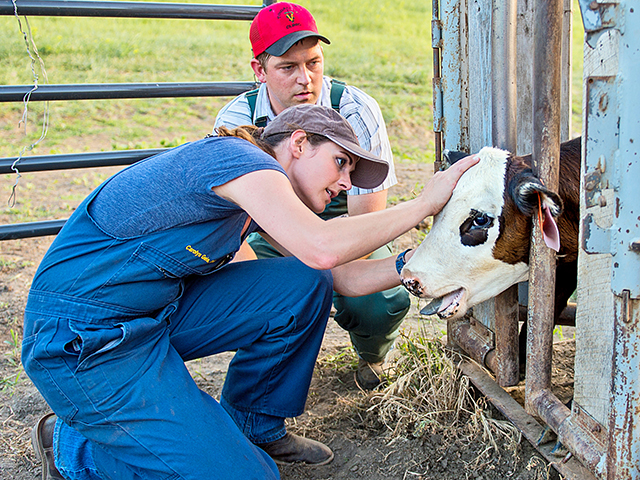Ask the Vet
Veterinarian Prospects
READER: I am 13 and considering a career in veterinary medicine. Can you tell me if becoming a veterinarian is worth it? Is there anything I could be doing now that would help me get into vet school? Finally, do you ever regret becoming a vet?
Dr. McMillan: I believe any career is worth it if you love what you do and make a difference for good in the world. I was attracted to veterinary medicine because I grew up on a farm, and I knew I wanted to be a farmer or help farmers. There is something very special and fulfilling in being able to help a farmer with his livestock.
For now, focus on being the best student you can be. While science and math skills are clearly needed in preveterinary studies, in veterinary school and in your day-to-day work, it's important to have very good English and communication skills. Experience with livestock is always a plus. And, if you have the opportunity, consider working with a veterinarian. It will help you know if this is really what you want to do. It is also a plus in the admissions process to vet school.
Veterinary medicine offers many career paths, besides the obvious clinical practice. Veterinarians work in education, diagnostic laboratories, veterinary and human biomedical research and development, consultation, the military and the government.
P[L1] D[0x0] M[300x250] OOP[F] ADUNIT[] T[]
There are also many career paths that do not require a veterinary degree. Licensed veterinary technicians or veterinary nurses can graduate with two to four years of training, and they are essential in all areas of our profession. Veterinary assistants, receptionists and other positions in clinical practice offer additional career options, and often these require no formal training. Pharmaceutical companies employee thousands of nonveterinarians in roles from research and development to sales.
To answer your last question, I have never regretted my career choice. I do regret those times when my work has interfered with my family time. A famous quote says, "No one on their deathbed ever said I wish I had spent more time at the office." So, my advice to anyone is to always consider your work- and homelife balance.
I wish you the best of luck. Find what makes your heart sing, and make a difference for good in every aspect of your life.
READER: I have heard there is a new once-a-year shot to prevent heartworms in dogs. Does it really work? Is it safe?
Dr. McMillan: The ProHeart 12 injection is the once-a-year heartworm preventative you're talking about. It was approved and released in 2019. My practice actually participated in the company's clinical trials for ProHeart 12, and we have used it extensively for our clients' dogs since it came on the market. We were impressed with its safety during the trials. While it's new here in the U.S., this preventative has been approved in Australia since 2001. It is the most commonly used heartworm preventative in that country and, as such, has had an excellent safety profile with millions of doses given.
READERS TALK BACK:
READER: I recently read your column about the differences in hay rings and them versus trailers or wagons. My husband and I have about 40 mama cows (which is not a lot compared to large operations), but we take pride in always having a nice-looking and healthy group. One point that my husband has made over the years is that we always move our hay rings to different locations throughout the pasture over the winter. We have noticed the cows will not waste as much because they are not standing on a pile of wet hay (that is saturated in urine and manure) trying to eat.
-D. Charles
> Please contact your veterinarian with questions pertaining to the health of your herd. Every operation is unique, and the information in this column does not pertain to all situations. This is not intended as medical advice but is purely for informational purposes.
> Write Dr. Ken McMillan at Ask The Vet, 2204 Lakeshore Dr., Suite 415, Birmingham, AL 35209, or email vet@progressivefarmer.com.
[PF_0520]
(c) Copyright 2020 DTN, LLC. All rights reserved.




